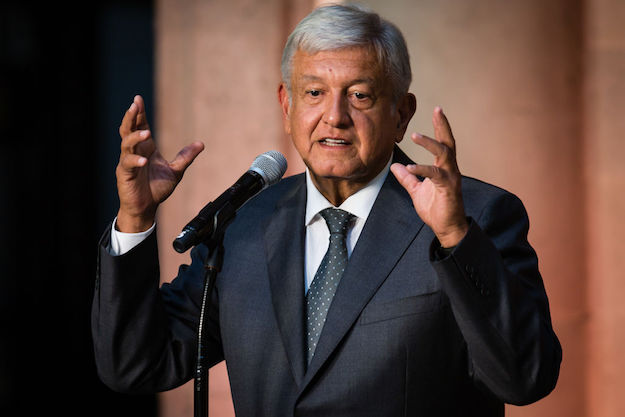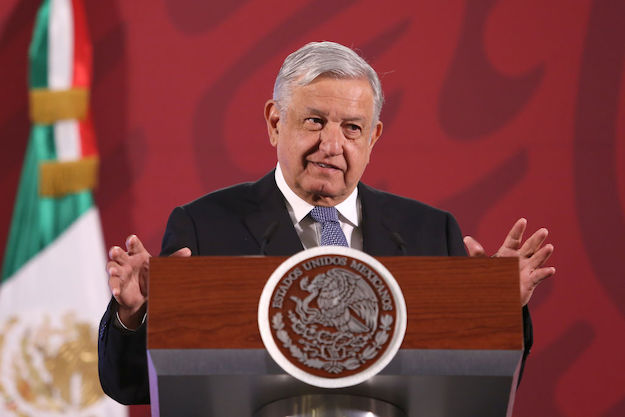Subscribe here to receive the AMLO Update by email
Highlight of the Week
An apparent end to NAFTA uncertainty isn’t the only economic news that could give Andrés Manuel López Obrador a lift.
Though oil prices dropped from four-year highs on Thursday, they remain well above levels seen throughout the second half of President Enrique Peña Nieto’s term. According to Duncan Wood, director of the Wilson Center’s Mexico Institute, high oil prices could help support López Obrador’s ambitious spending plans, particularly as his team becomes more aware of the limitations that government finances will put on their ability to implement campaign promises.
“López Obrador will feel it is doubly important to boost Pemex’s oil production,” Wood said. “At higher oil prices, Pemex is going to become, once again, an extremely important part of the Mexican government’s revenue.”
The need for revenue may also explain why AMLO is unlikely to disrupt oil contracts already signed as part of Peña Nieto’s energy reform, Wood said.
What they’re saying: Wood tells the San Diego Union-Tribune what the USMCA means for energy companies in Mexico; the The Financial Times on why investors are wary of AMLO’s oil plans; Enrique Quintana on AMLO’s economic reality check.
Stopping the Violence
Recent comments have led some analysts to question how much the president-elect’s security strategy will differ from that of his predecessor.
Speaking days before the 50th anniversary of the 1968 massacre of student protesters in Tlatelolco, López Obrador repeated earlier statements that withdrawing the military from public security activities was unfeasible in the short term. He also revived a controversial plan for a national guard that would combine military and federal police elements to form an “army of peace” to help control Mexico’s record levels of crime and violence.
Lisa Sánchez, the director of México Unido Contra la Delincuencia, told AQ that López Obrador is signaling he may step back from the prevention-first security policy he promised on the campaign trail.
“He seems to be leaning toward keeping things where they are, at least in the short term,” Sánchez said. “If that’s the case I think he’s going to have a very short honeymoon with the Mexican people.”
What they’re saying: López Obrador’s comments came as hundreds of advocacy groups called for the elimination of an internal security law now before the Supreme Court; Ernesto López Portillo offers a historical look at the tension between civilian and military authority in Mexico; Alejandro Hope says AMLO’s plan for a national guard is ”a bad idea that won’t die.”
Briefs
López Obrador said the incoming administration had “passed an important test” with the USMCA trade agreement. In an interview with newspaper El Universal published on Thursday, Jesús Seade, AMLO’s trade negotiator, said that the deal was good but that some provisions, including those on intellectual property, are “going to hurt.”
AMLO characterized his first phone call with U.S. President Donald Trump as “respectful.” Vice President Mike Pence will attend López Obrador’s inauguration on Dec. 1.
On Monday in Guanajuato, the president-elect promised to invest more than $200 million in the state’s Salamanca refinery, part of a planned $2.6 billion effort to modernize Pemex’s six underperforming refining facilities.
López Obrador suggested that Canadian manufacturer Bombardier could build train cars for his planned Tren Maya project in the country’s southeast. Company representatives said they had not been contacted by administration officials and would await details of the bidding process.
Quote of the Week
“They earn 250 thousand pesos a month … Have they stopped corruption in Mexico? Not at all.”
Andrés Manuel López Obrador criticized commissioners from Mexico’s national transparency agency, INAI, for failing to reveal key information about major corruption cases. Hours later, INAI ordered Mexico’s attorney general’s office to make public its corruption investigations related to Brazilian construction firm Odebrecht.
—
Russell is AQ’s correspondent in Mexico City








